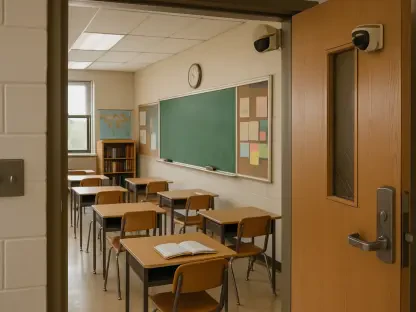In a stunning turn of events, the North Country region of New York finds itself at the heart of an educational crisis as SUNY Plattsburgh and SUNY Adirondack confront the abrupt loss of federal funding for their Upward Bound programs. This long-standing federal initiative, designed to support low-income and first-generation high school students, has provided essential resources such as academic counseling, college preparatory courses, and financial guidance for decades. The sudden termination of these funds has sent shockwaves through the community, leaving students without critical support, staff without jobs, and entire rural areas grappling with the implications of diminished access to higher education opportunities. For many in this underserved region, Upward Bound has been a beacon of hope, bridging the gap between challenging circumstances and the dream of a college degree. The impact of this decision reverberates far beyond the campuses, touching the lives of families and educators who relied on the program to level the playing field.
Federal Decision and Rationale
Unpacking the Funding Termination
The U.S. Department of Education recently revealed the reasoning behind the defunding of select Upward Bound programs across the nation, including those at SUNY Plattsburgh and SUNY Adirondack. According to spokesperson Ellen Keast, fewer than 30 programs were cut due to a perceived misalignment with current federal priorities. Specifically, concerns were raised about initiatives that appeared to emphasize what the Department described as “overt race preferences” or “divisive concepts.” An example cited involved a community college requesting funds for diversity and cultural sensitivity training, which was deemed inconsistent with federal objectives. Instead, the Department aims to redirect resources to alternative programs deemed “high-quality,” though specifics about these initiatives remain vague. This decision has sparked significant debate, as it challenges the foundational goals of programs like Upward Bound that aim to support disadvantaged students in achieving academic success.
The reaction from affected institutions highlights a stark contrast in perspective. College administrators argue that the focus on diversity within Upward Bound applications pertains to socioeconomic backgrounds and educational interests, not divisive ideologies. The emphasis has been on creating inclusive environments that cater to a broad range of student needs, particularly in rural areas like the North Country where access to resources is often limited. Leaders at both SUNY Plattsburgh and SUNY Adirondack contend that the program’s track record—spanning nearly six decades—demonstrates its value in fostering local talent, including future nurses, teachers, and other essential professionals. The federal rationale, therefore, appears disconnected from the on-the-ground realities and successes of Upward Bound, raising questions about the broader implications of such policy shifts for educational equity across the nation.
Policy Implications and Criticism
Criticism of the federal decision has been swift and pointed, with college officials expressing frustration over the lack of clarity and the apparent ideological basis for the cuts. At SUNY Adirondack, leadership underscored that their grant proposals aimed to balance participation across diverse student demographics, ensuring that programming was accessible and relevant to all. This approach, they argue, aligns with the core mission of supporting underserved communities rather than promoting any controversial agenda. The loss of funding for programs with proven outcomes feels like a step backward, especially in regions where educational disparities are already pronounced. The redirection of funds to unspecified alternatives further fuels skepticism about whether these new priorities will address the unique challenges faced by students in rural settings.
Beyond the immediate impact, the funding cuts signal a troubling trend in federal education policy that could affect similar initiatives nationwide. The decision to prioritize certain ideological stances over established programs like Upward Bound suggests a potential reshaping of how educational support is allocated. Administrators fear that this precedent may discourage future efforts to address systemic inequities through targeted interventions. In the North Country, where economic and geographic barriers already hinder access to higher education, the absence of Upward Bound risks widening the gap for low-income and first-generation students. As debates over federal priorities continue, the voices of affected students and educators remain crucial in highlighting the human cost of such policy decisions and advocating for a reconsideration of funding allocations.
Institutional and Community Response
Efforts to Mitigate the Loss
In the wake of the funding cuts, SUNY Plattsburgh and SUNY Adirondack have mobilized quickly to address the fallout, though the path forward remains fraught with challenges. Both institutions submitted formal requests for reconsideration and sought assistance from congressional representatives, hoping to reverse the decision. Unfortunately, these appeals were denied, leaving the colleges to navigate significant operational losses. At SUNY Plattsburgh, the termination of funding resulted in the elimination of six staff positions, severely undermining the program’s capacity to function. Heather Haskins, the Executive Director of Strategic Communications and Marketing, issued a statement expressing deep regret over the impact on the region and affirming a commitment to explore all possible solutions. Collaboration with the SUNY System and congressional allies continues as they search for alternative funding sources or reinstatement options.
Meanwhile, SUNY Adirondack has taken steps to cushion the immediate effects of the cuts, particularly in terms of staff layoffs. Under the guidance of President Anastasia Urtz, a transition plan is being developed to maintain some level of support for affected high schools. Efforts are underway to organize limited activities for students in nearby districts using existing campus resources. However, these measures fall short of the comprehensive support provided by the fully funded Upward Bound program, which relied on dedicated staff to deliver personalized guidance. The disparity between current efforts and past capabilities underscores the depth of the loss felt by the community. While both colleges remain resolute in minimizing disruption, the uncertainty surrounding long-term solutions casts a shadow over their ability to fully support students in the critical journey toward higher education.
Student Impact and Grassroots Advocacy
For students like Andrew Denton, a senior at Boquet Valley High School, the loss of Upward Bound support comes at a pivotal moment in their academic journeys. Having relied on the program for assistance with college applications, including tools like the Common App and essay preparation, Denton now faces the daunting prospect of navigating this process with diminished guidance. The personalized support from a trusted counselor over several years provided a sense of security that is difficult to replicate through alternative means. While school counselors and teachers offer some assistance, the tailored approach of Upward Bound is sorely missed, heightening fears of mistakes that could jeopardize college admissions prospects. The sudden void left by the program’s suspension has instilled a profound sense of anxiety among students at a time when confidence and clarity are most needed.
Beyond personal challenges, the broader implications for younger students weigh heavily on those affected by the cuts. Many, including Denton, worry that future generations in the North Country will miss out on the transformative opportunities that Upward Bound provided. In response, a wave of grassroots advocacy has emerged, with students taking the initiative to fight for the program’s restoration. Denton has launched a petition to urge federal officials to reinstate funding for Upward Bound and similar educational support initiatives. This effort reflects a collective determination within the community to preserve a vital resource for social mobility. The outpouring of support through petitions and community discussions highlights the program’s significance, not just as an academic tool, but as a cornerstone of hope for rural areas facing systemic barriers to higher education access. As these advocacy efforts gain traction, they underscore the resilience of students and families unwilling to let such a critical lifeline slip away.
Looking Ahead: Paths to Recovery
Reflecting on the aftermath of the funding cuts, it becomes clear that the termination of Upward Bound support at SUNY Plattsburgh and SUNY Adirondack marked a significant setback for educational equity in the North Country. The immediate suspension of programs disrupted the lives of countless students and led to staff layoffs, while the federal rationale for the decision stirred controversy and confusion. Despite exhaustive appeals and institutional efforts to mitigate the damage, the path to recovery remained uncertain at the time. Yet, the response from both colleges and students showcased a remarkable resolve to challenge the status quo and seek solutions. Moving forward, sustained collaboration with policymakers and community stakeholders could pave the way for alternative funding models or policy revisions. Additionally, amplifying student-led advocacy initiatives might pressure decision-makers to reconsider the value of programs like Upward Bound, ensuring that future generations in underserved regions retain access to the tools needed for academic and personal success.









